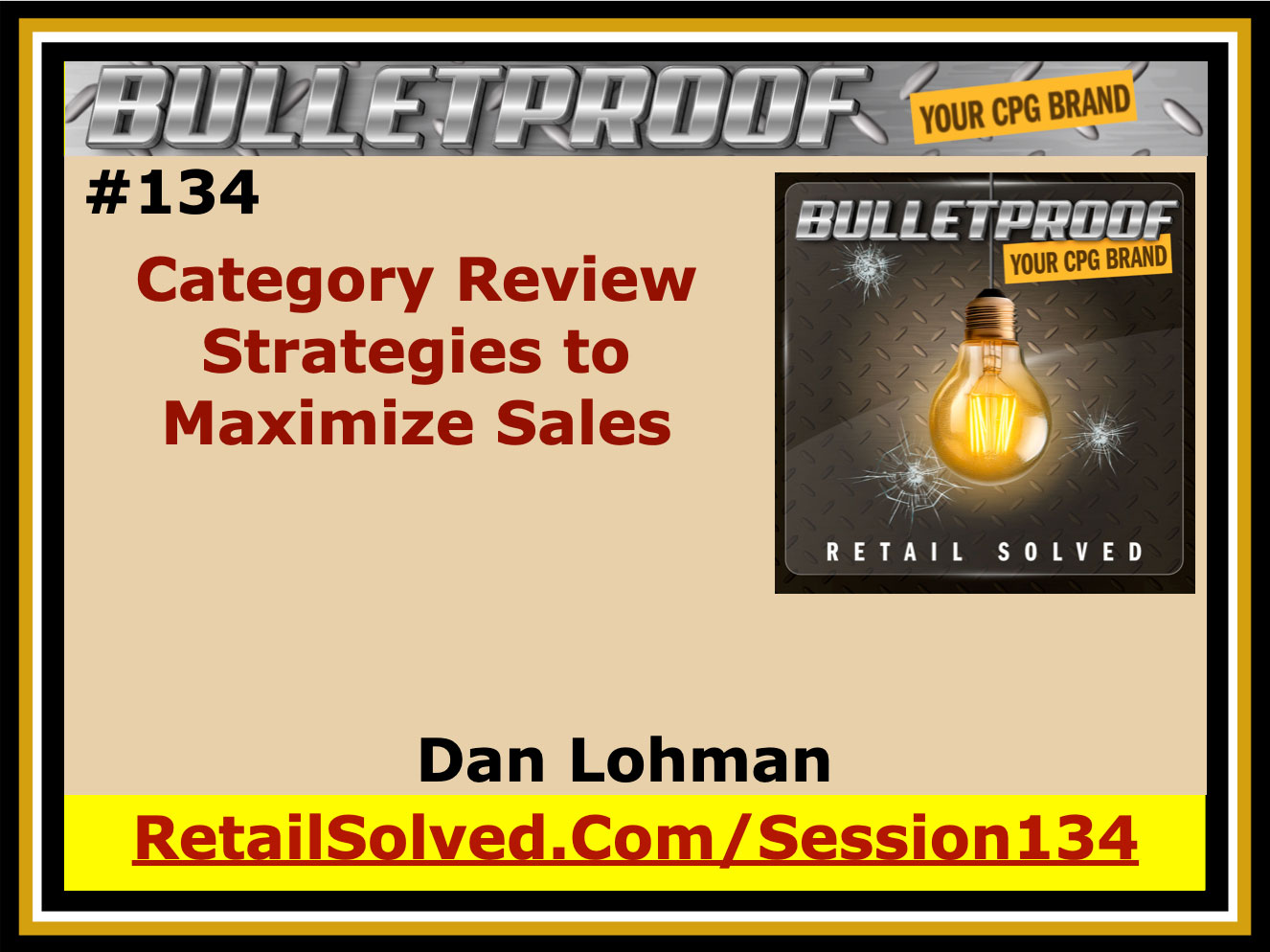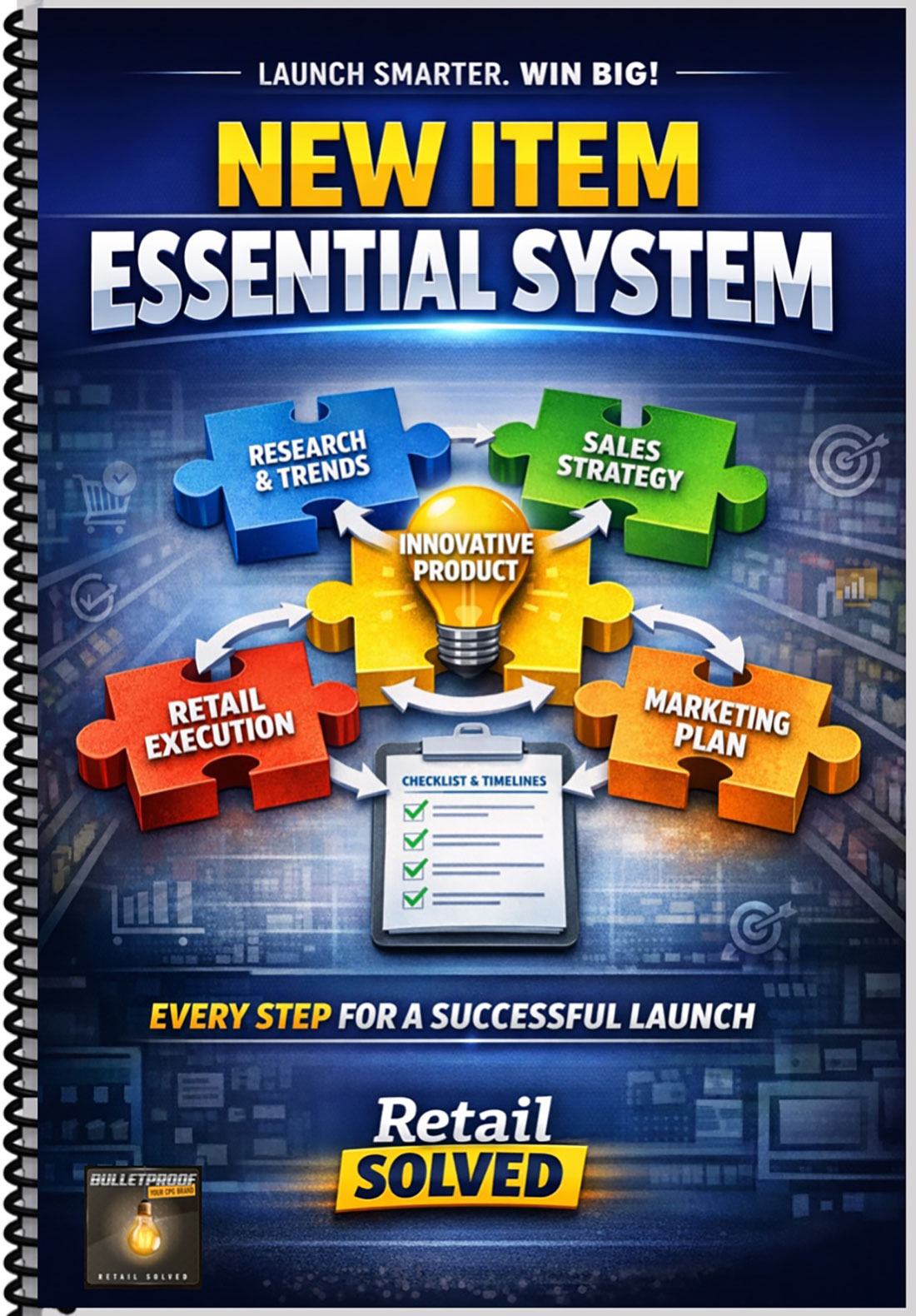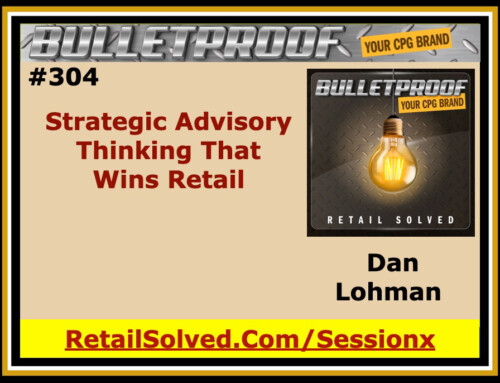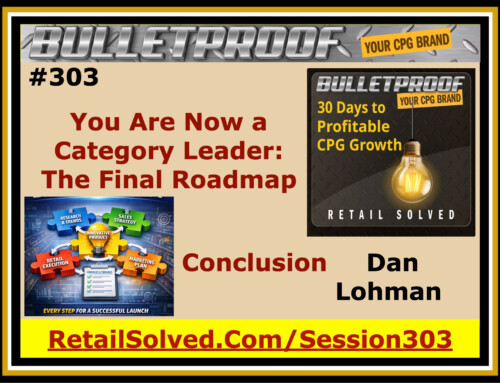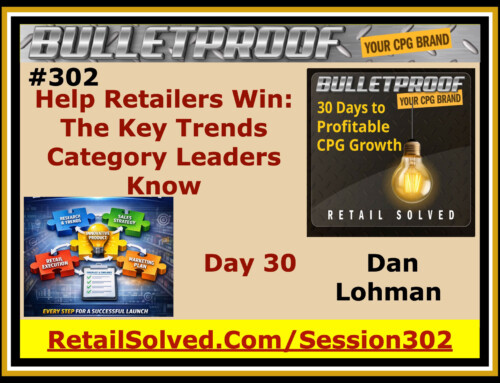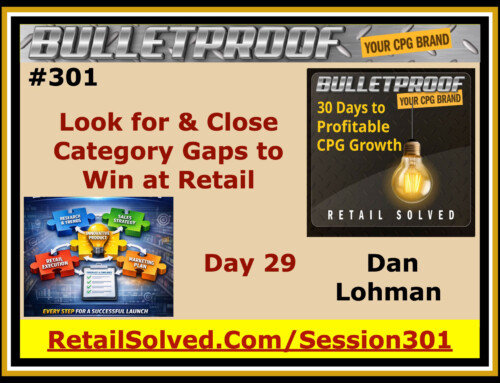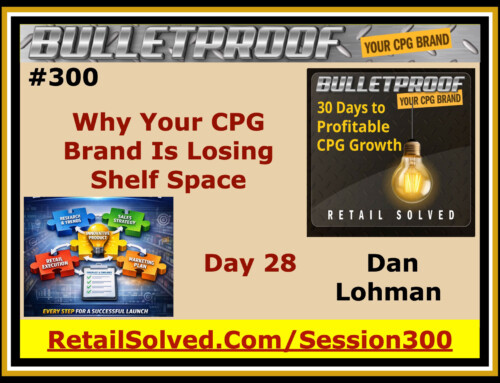Unlock your brand's potential with effective category review strategies that maximize sales and strengthen retailer relationships. Category reviews are crucial for brands to demonstrate value to retailers by driving sales and profitable shoppers. Beyond topline reports, brands should provide actionable insights and value to differentiate themselves and gain incremental distribution and promotional opportunities.
Category reviews are expected by most retailers. They are one of the most underutilized opportunities to differentiate your brand and explode sales. It begins with a collaborative retailer brand relationship/partnership. Maximize every opportunity!
Welcome. You worked hard to create a product that will disrupt the category, that will change the way people think about food. You've literally put all your love, attention, and energy into building a product that everyone's going to love and you're sure of it. You finally managed to gain retail distribution, but now what? Sadly, for a lot of brands, they think that this is where the selling stops. This is actually where the selling really begins. In other words, once you get your product onto a retailer shelf, now the challenge is, how do you get it off the retailer shelf and into the hands of more shoppers? This is where retailers start paying close attention to your brand to see how well you perform. And when I say perform, I'm talking about your ability to drive sales in the category and, more importantly, your brand's ability to drive profitable shoppers into the retail store.
Let me frame it this way. You're helping the retailer get what they want, more shoppers in their store, a reasonable profit, and more growth in the category. Brands that are able to do this are the brands that retailers are going to work with, the brands that the retailers are going to want to help support and help drive sales with. This goes back to the category review strategies. Category reviews are something that every brand has to participate in, and most retailers expect them.
So what is a category review? Think of a category review in the same way that you think of a checkup. When you go see your doctor on an annual basis, they'll check your blood, weight, blood pressure, listen to your heart, review your medications, etc. A category review is essentially the same thing. It's an assessment of how your brand is performing on the retailer shelf. It's a review or an assessment of the category and how much you're doing to contribute to drive sales in the category and bring more shoppers into their store.
Download the show notes below
Listen where you get your podcast
Important: Brand Secrets and Strategies has been rebranded to Retail Solved. Please swap all BrandSecretsandStrategies.com URL’s with RetailSolved.com. This is now the Bulletproof Your Brand podcast. Thank you for listening! BRAND SECRETS AND STRATEGIES PODCAST #134 Hello and thank you for joining us today. This is the Brand Secrets and Strategies Podcast #134 Welcome to the Brand Secrets and Strategies podcast where the focus is on empowering brands and raising the bar. I’m your host Dan Lohman. This weekly show is dedicated to getting your brand on the shelf and keeping it there. Get ready to learn actionable insights and strategic solutions to grow your brand and save you valuable time and money. LETS ROLL UP OUR SLEEVES AND GET STARTED! Welcome. You worked hard to create a product that will disrupt the category, that will change the way people think about food. You've literally put all your love, attention, and energy into building a product that everyone's going to love and you're sure of it. You finally managed to gain retail distribution, but now what? Sadly, for a lot of brands, they think that this is where the selling stops. This is actually where the selling really begins. In other words, once you get your product onto a retailer shelf, now the challenge is, how do you get it off the retailer shelf and into the hands of more shoppers? This is where retailers start paying close attention to your brand to see how well you perform. And when I say perform, I'm talking about your ability to drive sales in the category and, more importantly, your brand's ability to drive profitable shoppers into the retail store. Let me frame it this way. You're helping the retailer get what they want, more shoppers in their store, a reasonable profit, and more growth in the category. Brands that are able to do this are the brands that retailers are going to work with, the brands that the retailers are going to want to help support and help drive sales with. This goes back to the category review strategies. Category reviews are something that every brand has to participate in, and most retailers expect them. So what is a category review? Think of a category review in the same way that you think of a checkup. When you go see your doctor on an annual basis, they'll check your blood, weight, blood pressure, listen to your heart, review your medications, etc. A category review is essentially the same thing. It's an assessment of how your brand is performing on the retailer shelf. It's a review or an assessment of the category and how much you're doing to contribute to drive sales in the category and bring more shoppers into their store.. At the risk of dating myself, when I started in this career in this industry, it was all about relationship. In other words, when I went to the retailer, how was my relationship with them? A lot of times, your ability to get incremental distribution or promotions had more to do with your relationship with the retailer than how your product actually performed on their shelf. Over time, that change and then it became more about how much you had to give the retailer to promote your product. Both of these strategies were horribly inefficient. For example, I remember once getting a brand kicked off a retailer shelf because it was collecting dust. It was hardly selling at all. It deserved to be discontinued. I recommended that it be discontinued to make room for our new item. It was a line extension, and we had the number one performing brand in the category. Long story short, our competitor gave the retailer a bunch of money to buy the space back to be able to get their product put back on the retailer shelf. This meant that we weren't able to gain distribution in the store on our new items. Sadly for the retailer, the brand that the manufacturer paid a lot of money to get back on the shelf still underperformed on the shelf and other retailers were able to compete more effectively in the category because they had our new items. To make things worse for that retailer, all their competitors had discontinued the brand that the manufacturer paid a lot of money for. And if the retailer had accepted my recommendations, they would have been the leader in the category in their market. This is one of the key reasons that category management was founded. It was designed to weed out some of the inefficiencies and the costs in retail distribution, for example, making sure that a retailer didn't have too much back stock or too much inventory on hand, making sure that there's enough product on the shelf to be able to support consumer demand, and much, much more. Before I go any further, I want to live quick shout-out to a listener who left a great review. "A wealth of information," says, "Deanimal Promo Queen. "I work for Promomash. We help emerging brands in the natural organic space built a process for managing their in-store demo programs using data to make the best decisions possible to grow brand awareness and increase profitability. I recently discovered the Brand Secrets and Strategies podcasts and I can't stop listening. Dan truly has a wealth of experience and information that by leveraging I will undoubtedly be an even better adviser to the brands we serve. Thank you for the fantastic podcast. I will share it with everyone." Thanks, Deanimal. I really appreciate the review. If you want me to read your review, please leave a review or an iTunes, comment on any of my posts, or send me an email. I appreciate and read every one of them. After all, this is why I do this. Remember, this podcast is about you and it's for you. If you like the podcast, subscribe, share it with a friend, and leave a review. We rise by helping each other. I also want to remind you that at the end of every episode there's a free downloadable guide that you can use to grow sustainable sales. I always include one easy-to-download, quick-to-digest strategy that you can insight up and make your own, one that you can use to grow sustainable sales and compete more effectively. Remember, the goal here is to get your product on more store shelves and into the hands of more shoppers. Now, back to my story about category reviews and why they matter and how you can use them to grow sales and profits. About the time that the term category management was coin, brands started helping the retailers drive sales in their categories by leveraging the strengths of the unique consumer that bought their products. Back then, the focus was more on how well your brand performed, in other words, what was your sales volume, did you grow sales, et cetera. This is very similar to the way category management is viewed in the natural channel. It's primarily focused on how you show up on a item ranking report. Well, as you've heard me say lots of times, a canned topline report will not differentiate you from your competition. You need to go well beyond that, and that's the focus of this podcast. Category management mainstream has evolved a lot since the term was first coined in the early '90s. We started including shopper marketing and much more to help differentiate brands with the retailers. Sadly, due to what I call pushbutton category management, in other words, all the canned topline reports that are automatically generated by various companies and solution providers, I believe that category management has sort of lost its way. Let me explain. When a lot of people, even the big companies, think about category management, they do it on autopilot. In other words, they use a bunch of canned topline reports to begin and end their analysis. And if you've been listening to this podcast for a long time, you know that that's how I actually started my career. When I started doing this, there were no canned topline reports. Everything was customized. Being proficient in Excel, actually, Lotus 1-2-3 before that, I started building a lot of the canned reports that Kimberly-Clark and Unilever relied on. As a result, I built a really good solid reputation around this. In fact, I built a lot of the templates that retailers were expecting other brands that complete during their category reviews as a result. This is similar to the reports that I built when I worked for SPINS. Have you ever seen their distribution tracker? That's the report that I designed and built that I use to try to convince them to start selling retailer and store level data, what you can get today from them. These are a great starting place for any analysis, but canned topline reports will not differentiate you from your competition. Canned topline reports will not tell you the story of why what happened happened. In other words, why did a consumer choose your product over another product or vice versa? The strategies that I'm working hard to bring to this industry are the same strategies where I'm trying to teach you how to get the most out of the data, how to help the retailer tell a story about why your brand matters, and why consumers flock to your brand, and why your brand does more to drive consumer traffic and sales in the category and contribution than your competitors. This is why I coined the term true category management to differentiate what I'm talking about in terms of the advanced strategies that you can use to compete more effectively to relying solely on canned topline reports, or what I call push button category management. So what qualifies me to be able to have this discussion with you in the first place? I am the first person certified at the highest level category management proficiency, a certified professional strategic advisor, CPSA. You typically find someone with that level of expertise as the vice president of category management for a major mainstream brand. The reason I like working in natural is because I love working with emerging brands and I love working with enthusiastic entrepreneurs that are trying to disrupt the category and change the way that we think about food, especially authentic, mission-driven brands working to solve a problem that other brands overlook. If you need more proof, then listen to the podcast, especially episode 115 with Michael J. O'Donnell. And check out some of the many reviews I received, including from people like Phil Lempert, the SupermarketGuru, Bill Bishop, and other industry icons. I don't share this to impress you. I share this to impress upon you the difference. What I'm getting at is that there are a lot of people in this space that claim to provide a high level of expertise. Let's face it, just like in any profession, there are good and bad doctors, there are good and bad consultants, et cetera. You've worked hard to build a brand, and I think you should own your strategy. This is something that I highly recommend that you don't farm out to a broker, to an agency, to anyone else. This is something that you need to own internally. I'm trying to teach you this skill so that you can do that so that when you do farm out parts of this to your broker, to an agency, to someone else, you can ensure that you're getting the very best from them, that you're getting more from them than other brands that they work with. I want to help you ensure that they are focused more on execution so that they're executing at the highest level possible for you and not relying on the same cookie-cutter strategies that they might use with other brands. The reward for doing this well is that some savvy retailers will bend over backwards to give you incremental distribution, incremental promotional opportunities, and much more. In fact, savvy retailers will begin to rely upon you. I've had several opportunities and occasions where retailers have given me these opportunities and not charged me anything incremental like they charge other brands. This is why this matters. Category review sales to grow sales and profits, this is where it begins, by providing value to the retailer, by providing more value than any of your competitors. Remember, retailers generically don't make anything. What they do is they sell real estate in the form of space that your product takes up on their shelves. They want brands willing and able to step up and help them drive profitable category sales. They want insights, actionable insights, that they can't get from your competition or anyone else. The focus of this podcast, all my content, the mini courses, the YouTube channel, and everything are designed to help you maximize each and every opportunity that you get from a retailer. Every opportunity that you get with a retailer should be used to help educate the retailer about the category, what's unique about the category, how their category's performing relative to their competition in their market, et cetera. More importantly, what's unique about your customer? What are the trends that they need to be paying attention to? As you provide additional insights to the retailer, this is how you differentiate yourself from being just another package on their shelves to being a category leader. A pro tip, something that I started doing years ago that helped me stand out with retailers that gave me a significant and substantial competitive advantage, I started using each and every opportunity to get in front of a retailer as a mini category review. In other words, even new item presentations, even when I was starting out, I made sure that there was an appendix that had additional information to help support the retailer. Like you're going to find, you have a very limited amount of time when you start working with a retailer. However, when you start using these strategies and they start to appreciate how much additional value you're providing to them over and above your competition, they're going to start making more time for you. As a result, 15-minute meetings might turn into a half an hour, an hour, or even longer. This is exactly what you and what every brand should be striving for. You can do more to drive sales and grow your brand by using these strategies than you can by paying for promotions or anything else, literally. This is how I was able to push around some of the largest and most iconic brands in the industry on a regular basis. This worked for me, and it can work for you. So what do you do if you're just starting out? Well, the first thing you want to do is you want to understand what does the retailer expect from you. You want to make sure that you understand everything that they're looking for from you. They'll probably have some sort of a template or some sort of a package that you need to complete for your category review. You want to do exactly everything that they've asked for before you consider doing anything more. Now, you've probably heard the retailer or other people in the industry tell you that the retailer doesn't want any additional information. They just want exactly what they've got, nothing extra, period. Well, have you ever heard the expression that one bad apple can spoil a bunch? The reason for this is that there are a lot of brands out there that are focused on their brand only so that when they get in front of the retailer, it's about me, me, me. How can you the retailer help grow my brand? This is what I need you to do, and this is how I need you to do it. This is not how you form a collaborative relationship. This is strictly transactional at this point. Remember, we're trying to differentiate you from your competition. And by the way, this is where I started out with every new retailer relationship that I began, so this is not uncommon at all. You're going to start out providing exactly what they want, and then you're going to leave an appendix or you're going to created additional information. For example, they'll probably ask you to complete a bunch of canned topline reports. Instead of just saying, "Hey, we're ranked number three and the category ourselves are up 3%, et cetera," leave a narrative or have a narrative prepared so that you can explain why you're up that high. In other words, did you promote? What did you do different than other brands? And when you're talking about or focused on your competition, what did they do to drive sales? Are their sales generated by just a lot of promotions and is that sustainable? Are they driving sales in the category? This is the focus of several podcast episodes as well as several mini courses. There's a lot of could talk about here, and I could go on for hours, and hours, and hours. On top of that, every situation is unique. The point is the better you can tell a story, why what happened happened, in other words, what was the cause and the effect of the promotion of whatever that drove sales in the category, the more effective your at storytelling, the better you're going to be able to provide actionable insights to the retailer, actionable insights that'll give a competitive advantage in their market and help them satisfy your shoppers. The next thing I recommend is that you have a question ready to ask them, a question that you already know the answer to because you've done your research and because you know exactly what they're looking for in the category and to gross sales. The point of this exercise is to get them to start thinking more strategically about the category, to start thinking about how your product aligns with the consumer that they're trying to attract. Questions like this are a great way to challenge your retail partner to think more strategically about the category. Now, when I say challenge, I don't mean that in a negative sense. Just encourage them to think about things that they might not normally be thinking about. In other words, their job is to try to figure out how to grow sales in the category, but what does that mean? Why is that important and what objective are they trying to accomplish? By asking these types of questions and helping to provide the solutions through your brand, this is one of the best ways to differentiate yourself and challenge the retailer to expect more from you. Remember, the goal here is to have the retailer go to you first when they need something like an incremental display or incremental distribution or something. This is one of the ways that you prove your worth. You want the retailer to know, like, and trust you. You want the retailer to think of you first, think of your brand first when they have a need for an incremental display, or promotion, or something like that. You want the retailer to know, absolutely know, that you're going to be the brand that's going to deliver at an exceptional high value, a brand that they can trust to be able to provide the kind of service that they expect for their customers. And to be able to do this effectively, you've got to know exactly who your retail partner is. not just their address and the name of the person you're calling on, but you've got to know all the key contacts that work for that retailer. This is one of the main things that I focus on on the free Turnkey Sales Stories Strategies course. You need to know all the key players at the retailer and how they interact with your brand and what their role is in helping to support your brand so that when you've got a promotion or incremental distribution or something like that you know exactly who to go to to ensure that you've got the right amount of product in the back room of each store to support every promotion, et cetera. You want to know the person who's going to make all the signs, the person who's responsible for doing all their promotions, scheduling the social media posts, et cetera. I used to make notes and then I'd be able to send them emails and actually birthday cards, et cetera, to just to let them know how much I appreciate them and how much I appreciate their contribution to helping me grow my brand, which in turn help them grow profitable category sales. I go deeper into these strategies in the mini course Category Review Strategies to Grow Sales and Profits. You're going to want to check it out. It's going to help you differentiate your brand from all the other brands that the retailers are working with. It's going to help you stand out on a crowded shelf. And more importantly, it's going to help you help the retailer drive sales by leveraging the strength of the consumer that buys your brand. You can learn more about this mini course at brandsecretsandstrategies.com/reviewstrategies. I want to thank you again for listening. This week's free downloadable guide is What Is Category Management and Why is It Important? This'll give you some additional insights into how to leverage category management to grow sales and profits during a category review. It'll also help you identify how to leverage category management and advanced strategies so that you can differentiate your product from your competition. You can gain instant access to this on the podcast show notes and on the podcast webpage at brandsecretsandstrategies.com/session134. Thank you for listening, and I look forward to seeing you in the next episode. This episode's FREE downloadable guide The great equalizer between small and large brands. Learn how it has evolved and the advanced strategies that retailers really want and need from you and your brand. CLICK HERE TO DOWNLOAD YOUR FREE STRATEGIC GUIDE: What is Category Management and Why It's So Important Thanks again for joining us today. Make sure to stop over at brandsecretsandstrategies.com for the show notes along with more great brand building articles and resources. Check out my free course Turnkey Sales Story Strategies, your roadmap to success. You can find that on my website or at TurnkeySalesStoryStrategies.com/growsales. Please subscribe to the podcast, leave a review, and recommend it to your friends and colleagues. Sign up today on my website so you don’t miss out on actionable insights and strategic solutions to grow your brand and save you valuable time and money. I appreciate all the positive feedback. Keep your suggestions coming. Until next time, this is Dan Lohman with Brand Secrets and Strategies where the focus is on empowering brands and raising the bar.
Enter your name and email address below and I'll send you periodic brand building advice, tips and strategies.
Sign up to receive email updates
FREE Trade Promotion ROI Calculator:
Click Here To Maximize Sales And Profits
Image is the property of CMS4CPG LLC, distribution or reproduction is expressively prohibited.
